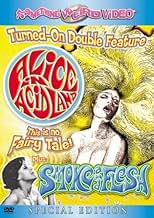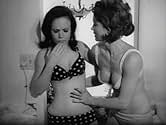At its root, the filmmaker's dilemma has two fangs.
One challenge is to take things that people know and bend and filter them in ways that can be seen as "natural" when it gets to the other side, past the set, the film, the beam, the retina, the neurons. In other words, most filmmakers struggle with us to show us what we know.
On the other hand, some filmmakers attempt to show us what we don't know, or think we know but have never seen. Possibly love falls in this category, but that's another story. The challenge of this game is developing a vocabulary to take us to the unfamiliar, using bits and pieces of a vocabulary from the familiar.
Its the first challenge that the theatrical types love: truth, passion and all that. But its the second that fascinates me, at least this week.
In this "other world" category are the standard parade of movies about mathematics, mysticism, afterdeath, art (sometimes), or mental deviance (when we get the first person view). Oddly, the same conventions are usually used for all of these, making many of these possibly the worst films in existence.
And then there are the hallucinogenic drug movies. These are fascinating. I might make a special study of these, starting before the period when some significant number of viewers actually could be counted on to be experienced in this regard.
If you were to start such a study, dear viewer, you need to start with "Easy Rider," "Head" and this, all made in the same year.
This one is in a different camp from the others because it chooses a sexual metaphor. The story is contrived to set us up by establishing a sexually driven trace, a call into the viewer's mind to memories that we all have about transit to another world while having sex.
I'm really impressed by the idea. We do end up with all the standard bumph of colored lights on bodies, not much different than say the psychedelic scenes in "Behind the Green Door," which used the same sex and psychedelic formula. Except by that time filmmakers were showing penetration.
"Green Door" takes a slightly different formula than here: the story is about a movie of a show. This Alice case is instead a different type of show: a documentary, a warning, along the lines of "Reefer Madness."
By the way, people laugh at "Reefer Madness," thinking it an inept, stodgy piece of misinformed propaganda. Look again folks and see that it is constructed according to a strictly psychedelic model, obviously by someone who knew. Its a "Saragossa Manuscript" in mufti.
Okay, back to this. There is no reason to watch it unless you are into these things, these cinematic challenges. But if you are interested in film, and other worlds, try this concoction of visual science fiction as charmed up by entranced lesbian sex.
Ted's Evaluation -- 2 of 3: Has some interesting elements.




















